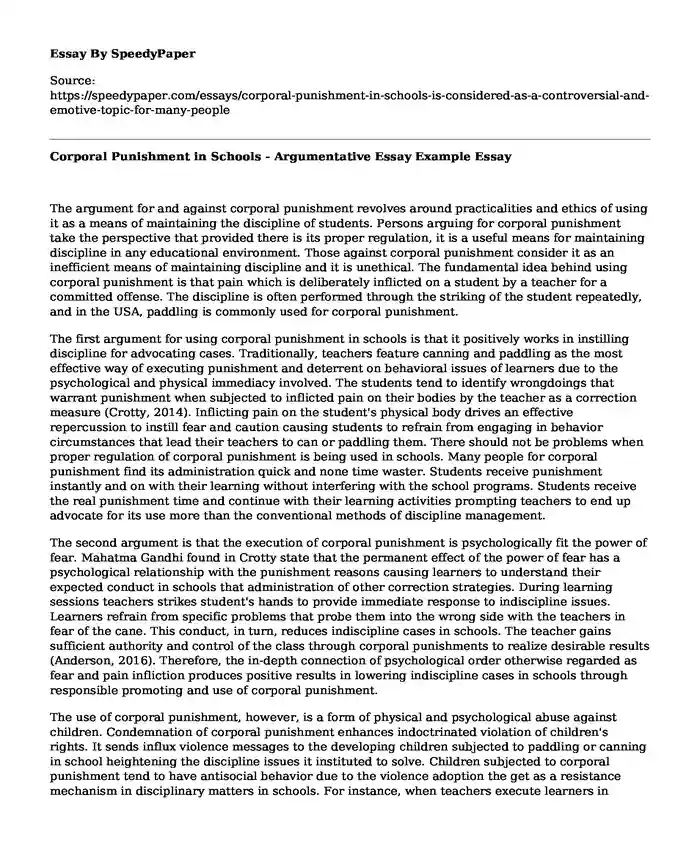
| Essay type: | Argumentative essays |
| Categories: | School Punishment |
| Pages: | 4 |
| Wordcount: | 861 words |
The argument for and against corporal punishment revolves around practicalities and ethics of using it as a means of maintaining the discipline of students. Persons arguing for corporal punishment take the perspective that provided there is its proper regulation, it is a useful means for maintaining discipline in any educational environment. Those against corporal punishment consider it as an inefficient means of maintaining discipline and it is unethical. The fundamental idea behind using corporal punishment is that pain which is deliberately inflicted on a student by a teacher for a committed offense. The discipline is often performed through the striking of the student repeatedly, and in the USA, paddling is commonly used for corporal punishment.
The first argument for using corporal punishment in schools is that it positively works in instilling discipline for advocating cases. Traditionally, teachers feature canning and paddling as the most effective way of executing punishment and deterrent on behavioral issues of learners due to the psychological and physical immediacy involved. The students tend to identify wrongdoings that warrant punishment when subjected to inflicted pain on their bodies by the teacher as a correction measure (Crotty, 2014). Inflicting pain on the student's physical body drives an effective repercussion to instill fear and caution causing students to refrain from engaging in behavior circumstances that lead their teachers to can or paddling them. There should not be problems when proper regulation of corporal punishment is being used in schools. Many people for corporal punishment find its administration quick and none time waster. Students receive punishment instantly and on with their learning without interfering with the school programs. Students receive the real punishment time and continue with their learning activities prompting teachers to end up advocate for its use more than the conventional methods of discipline management.
The second argument is that the execution of corporal punishment is psychologically fit the power of fear. Mahatma Gandhi found in Crotty state that the permanent effect of the power of fear has a psychological relationship with the punishment reasons causing learners to understand their expected conduct in schools that administration of other correction strategies. During learning sessions teachers strikes student's hands to provide immediate response to indiscipline issues. Learners refrain from specific problems that probe them into the wrong side with the teachers in fear of the cane. This conduct, in turn, reduces indiscipline cases in schools. The teacher gains sufficient authority and control of the class through corporal punishments to realize desirable results (Anderson, 2016). Therefore, the in-depth connection of psychological order otherwise regarded as fear and pain infliction produces positive results in lowering indiscipline cases in schools through responsible promoting and use of corporal punishment.
The use of corporal punishment, however, is a form of physical and psychological abuse against children. Condemnation of corporal punishment enhances indoctrinated violation of children's rights. It sends influx violence messages to the developing children subjected to paddling or canning in school heightening the discipline issues it instituted to solve. Children subjected to corporal punishment tend to have antisocial behavior due to the violence adoption the get as a resistance mechanism in disciplinary matters in schools. For instance, when teachers execute learners in school, the learners feel inferior to the teachers' authority probing them to be violent with each other. Again, corporal punishment stains the teacher-learners relationship when fear and authority negatively instilled in the administration of discipline (Gershoff and Font, 2016). The institution of corporal punishment as the discipline control strategy losses the grip in ensuring child-centered learning environment.
There is no guarantee that schools using corporal punishment are any more orderly or disciplined than those who do not. If anything, the effects of this type of punishment are more harmful and not positive, and they serve in undermining the relationship between pupil and teachers. Where corporal punishment is in place, there is evidence that it is not utilized in an even-handed manner. For examples, boy is more prone to receiving the punishment compared to girls. African-Americans receive this mode of punishment more often compared than school children of White origin who commit the same offense.
In conclusion, the controversy surrounding the issue advocating for and against the administration of corporal punishment in schools yield heated debates on both sides of the coin. Through, a majority of countries globally fight against its use in schools and call from regulations for its administration by parents and caregivers, many educators still feels that it's the easiest way to administer corrective disciplinary strategies. The psychological and physical havoc discouraged from the institution of corporal punishment in schools yield antisocial challenges to students. Thus, the short-term benefits caused by corporal punishment do not override long-term harm established on the child.
Works cited
Anderson, Melinda D. The States Where Teachers Can Still Spank Students. The Atlantic, 2016.
Crotty, James Marshall. Should Corporal Punishment Be Allowed In Schools? The Little Black Book of Billionaire Secrets, SEP 21, 2014 @ 04:49 PM. Available at https://www.forbes.com/sites/jamesmarshallcrotty/2014/09/21/should-corporal-punishment-be-allowed-in-schools/#78cdbe4328f5 Accessed on 3rd April 2018.
Gershoff, E.T. & Font, S.A. Corporal punishment in U.S. public schools: Prevalence, disparities in use, and status in state and federal policy (PDF). Society for Research and Child Development. 2016, 30: 1
Cite this page
Corporal Punishment in Schools - Argumentative Essay Example. (2022, Apr 21). Retrieved from https://speedypaper.net/essays/corporal-punishment-in-schools-is-considered-as-a-controversial-and-emotive-topic-for-many-people
Request Removal
If you are the original author of this essay and no longer wish to have it published on the SpeedyPaper website, please click below to request its removal:
- Free Essay with Knowledge on How to Start Writing
- Free Essay on Project Management Competencies
- Law Essay Sample: Coles and Woolworth's Breached Shopper-Docket Undertakings
- Essay Sample: Does Religion Have a Place in Public Life
- Free Essay on the Role of the Family Nurse Practitioner
- Evaluation of Waste Management
- History of Puerto Rico, Free Essay for Everyone
Popular categories




